IWSO 337 Report: Kinsman's Critique of Marx and Engels on Sexuality
VerifiedAdded on 2022/08/12
|6
|1219
|15
Report
AI Summary
This report examines Gary Kinsman's work on sexuality and morality, focusing on his use of historical materialism to analyze the development of homosexuality and critique the theories of Marx and Engels. Kinsman argued against the economic determinism of Marxists, emphasizing the role of sensuality, eroticism, and psychological implications in homosexual relationships. He highlighted how capitalist society and patriarchal structures define sexual relationships, while also noting that changes in social contexts and feminist movements have brought shifts in societal views. The report contrasts Kinsman's perspective with other sociological works, providing a comprehensive overview of his contributions to understanding sexuality and social structures. It also explores how Kinsman's ideas challenge the heterosexual hegemony and advocate for a more nuanced understanding of sexual practices and identities.
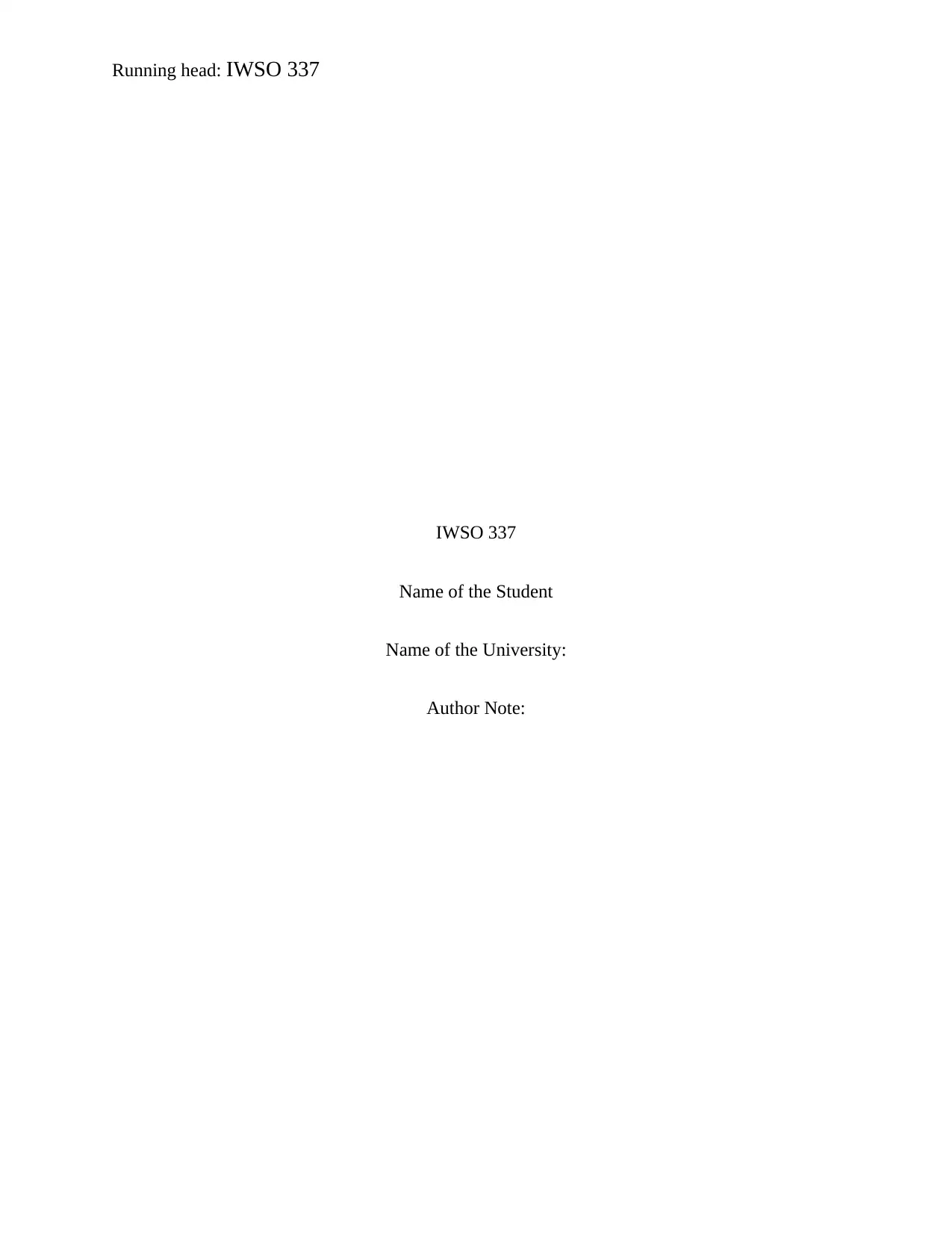
Running head: IWSO 337
IWSO 337
Name of the Student
Name of the University:
Author Note:
IWSO 337
Name of the Student
Name of the University:
Author Note:
Paraphrase This Document
Need a fresh take? Get an instant paraphrase of this document with our AI Paraphraser
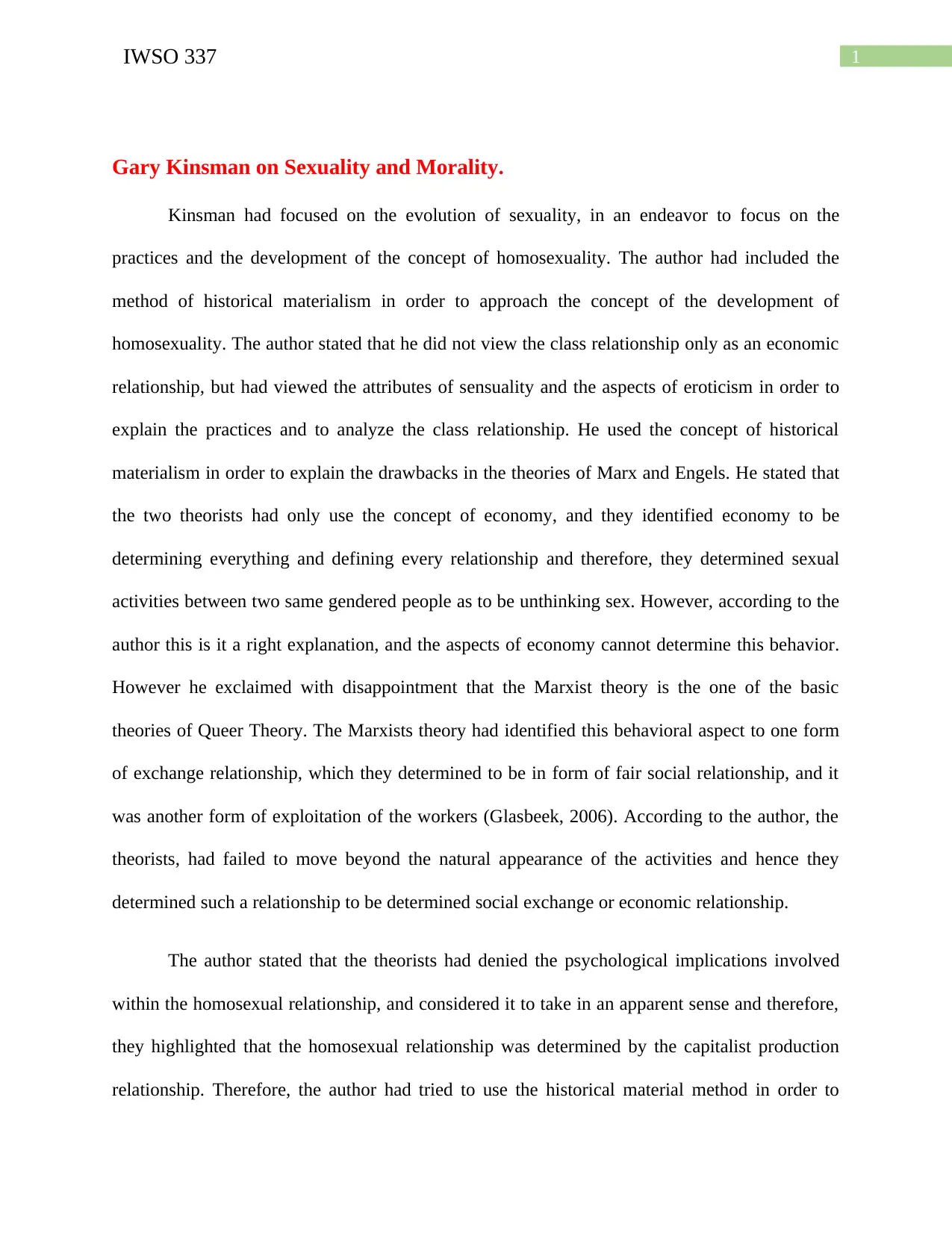
1IWSO 337
Gary Kinsman on Sexuality and Morality.
Kinsman had focused on the evolution of sexuality, in an endeavor to focus on the
practices and the development of the concept of homosexuality. The author had included the
method of historical materialism in order to approach the concept of the development of
homosexuality. The author stated that he did not view the class relationship only as an economic
relationship, but had viewed the attributes of sensuality and the aspects of eroticism in order to
explain the practices and to analyze the class relationship. He used the concept of historical
materialism in order to explain the drawbacks in the theories of Marx and Engels. He stated that
the two theorists had only use the concept of economy, and they identified economy to be
determining everything and defining every relationship and therefore, they determined sexual
activities between two same gendered people as to be unthinking sex. However, according to the
author this is it a right explanation, and the aspects of economy cannot determine this behavior.
However he exclaimed with disappointment that the Marxist theory is the one of the basic
theories of Queer Theory. The Marxists theory had identified this behavioral aspect to one form
of exchange relationship, which they determined to be in form of fair social relationship, and it
was another form of exploitation of the workers (Glasbeek, 2006). According to the author, the
theorists, had failed to move beyond the natural appearance of the activities and hence they
determined such a relationship to be determined social exchange or economic relationship.
The author stated that the theorists had denied the psychological implications involved
within the homosexual relationship, and considered it to take in an apparent sense and therefore,
they highlighted that the homosexual relationship was determined by the capitalist production
relationship. Therefore, the author had tried to use the historical material method in order to
Gary Kinsman on Sexuality and Morality.
Kinsman had focused on the evolution of sexuality, in an endeavor to focus on the
practices and the development of the concept of homosexuality. The author had included the
method of historical materialism in order to approach the concept of the development of
homosexuality. The author stated that he did not view the class relationship only as an economic
relationship, but had viewed the attributes of sensuality and the aspects of eroticism in order to
explain the practices and to analyze the class relationship. He used the concept of historical
materialism in order to explain the drawbacks in the theories of Marx and Engels. He stated that
the two theorists had only use the concept of economy, and they identified economy to be
determining everything and defining every relationship and therefore, they determined sexual
activities between two same gendered people as to be unthinking sex. However, according to the
author this is it a right explanation, and the aspects of economy cannot determine this behavior.
However he exclaimed with disappointment that the Marxist theory is the one of the basic
theories of Queer Theory. The Marxists theory had identified this behavioral aspect to one form
of exchange relationship, which they determined to be in form of fair social relationship, and it
was another form of exploitation of the workers (Glasbeek, 2006). According to the author, the
theorists, had failed to move beyond the natural appearance of the activities and hence they
determined such a relationship to be determined social exchange or economic relationship.
The author stated that the theorists had denied the psychological implications involved
within the homosexual relationship, and considered it to take in an apparent sense and therefore,
they highlighted that the homosexual relationship was determined by the capitalist production
relationship. Therefore, the author had tried to use the historical material method in order to
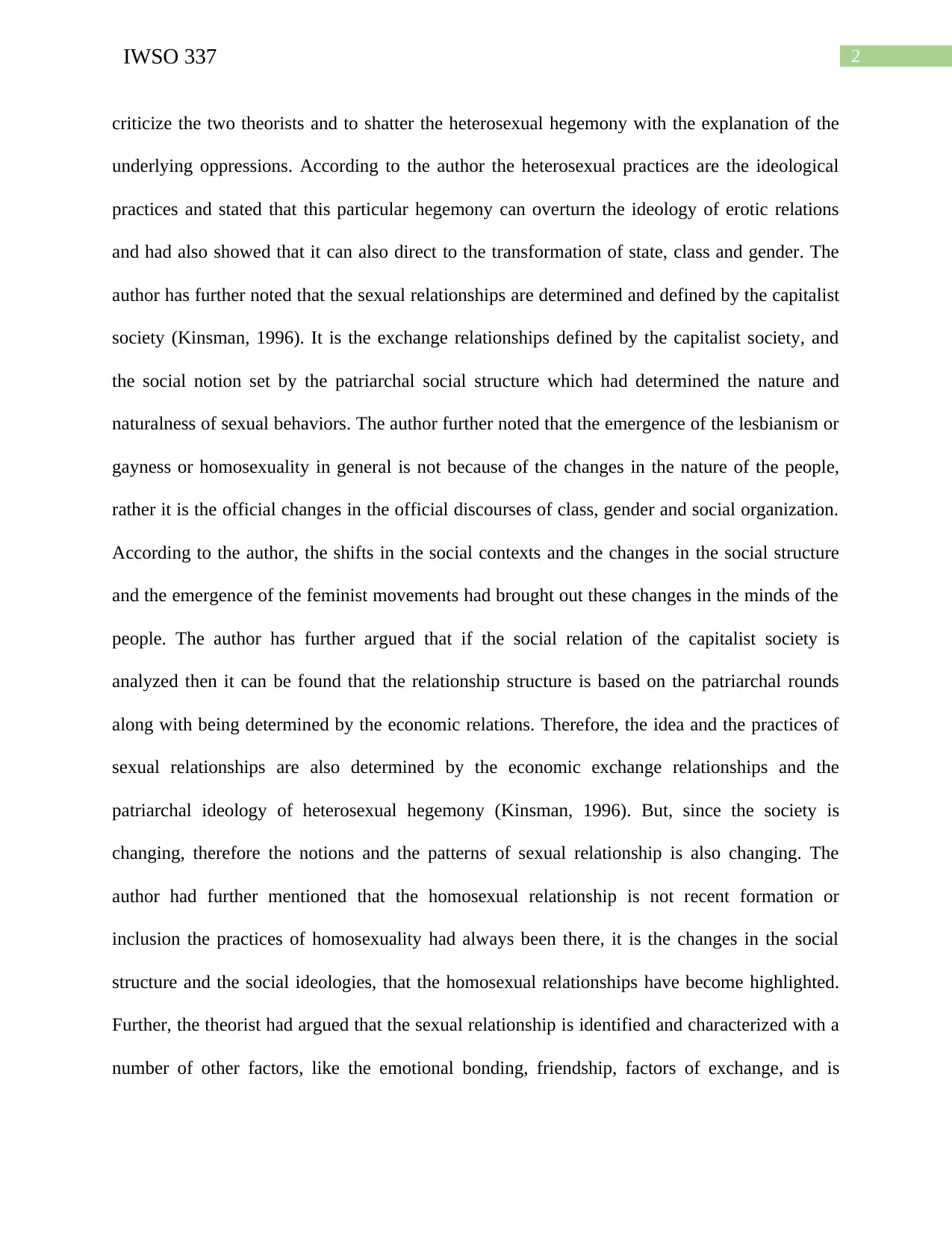
2IWSO 337
criticize the two theorists and to shatter the heterosexual hegemony with the explanation of the
underlying oppressions. According to the author the heterosexual practices are the ideological
practices and stated that this particular hegemony can overturn the ideology of erotic relations
and had also showed that it can also direct to the transformation of state, class and gender. The
author has further noted that the sexual relationships are determined and defined by the capitalist
society (Kinsman, 1996). It is the exchange relationships defined by the capitalist society, and
the social notion set by the patriarchal social structure which had determined the nature and
naturalness of sexual behaviors. The author further noted that the emergence of the lesbianism or
gayness or homosexuality in general is not because of the changes in the nature of the people,
rather it is the official changes in the official discourses of class, gender and social organization.
According to the author, the shifts in the social contexts and the changes in the social structure
and the emergence of the feminist movements had brought out these changes in the minds of the
people. The author has further argued that if the social relation of the capitalist society is
analyzed then it can be found that the relationship structure is based on the patriarchal rounds
along with being determined by the economic relations. Therefore, the idea and the practices of
sexual relationships are also determined by the economic exchange relationships and the
patriarchal ideology of heterosexual hegemony (Kinsman, 1996). But, since the society is
changing, therefore the notions and the patterns of sexual relationship is also changing. The
author had further mentioned that the homosexual relationship is not recent formation or
inclusion the practices of homosexuality had always been there, it is the changes in the social
structure and the social ideologies, that the homosexual relationships have become highlighted.
Further, the theorist had argued that the sexual relationship is identified and characterized with a
number of other factors, like the emotional bonding, friendship, factors of exchange, and is
criticize the two theorists and to shatter the heterosexual hegemony with the explanation of the
underlying oppressions. According to the author the heterosexual practices are the ideological
practices and stated that this particular hegemony can overturn the ideology of erotic relations
and had also showed that it can also direct to the transformation of state, class and gender. The
author has further noted that the sexual relationships are determined and defined by the capitalist
society (Kinsman, 1996). It is the exchange relationships defined by the capitalist society, and
the social notion set by the patriarchal social structure which had determined the nature and
naturalness of sexual behaviors. The author further noted that the emergence of the lesbianism or
gayness or homosexuality in general is not because of the changes in the nature of the people,
rather it is the official changes in the official discourses of class, gender and social organization.
According to the author, the shifts in the social contexts and the changes in the social structure
and the emergence of the feminist movements had brought out these changes in the minds of the
people. The author has further argued that if the social relation of the capitalist society is
analyzed then it can be found that the relationship structure is based on the patriarchal rounds
along with being determined by the economic relations. Therefore, the idea and the practices of
sexual relationships are also determined by the economic exchange relationships and the
patriarchal ideology of heterosexual hegemony (Kinsman, 1996). But, since the society is
changing, therefore the notions and the patterns of sexual relationship is also changing. The
author had further mentioned that the homosexual relationship is not recent formation or
inclusion the practices of homosexuality had always been there, it is the changes in the social
structure and the social ideologies, that the homosexual relationships have become highlighted.
Further, the theorist had argued that the sexual relationship is identified and characterized with a
number of other factors, like the emotional bonding, friendship, factors of exchange, and is
⊘ This is a preview!⊘
Do you want full access?
Subscribe today to unlock all pages.

Trusted by 1+ million students worldwide
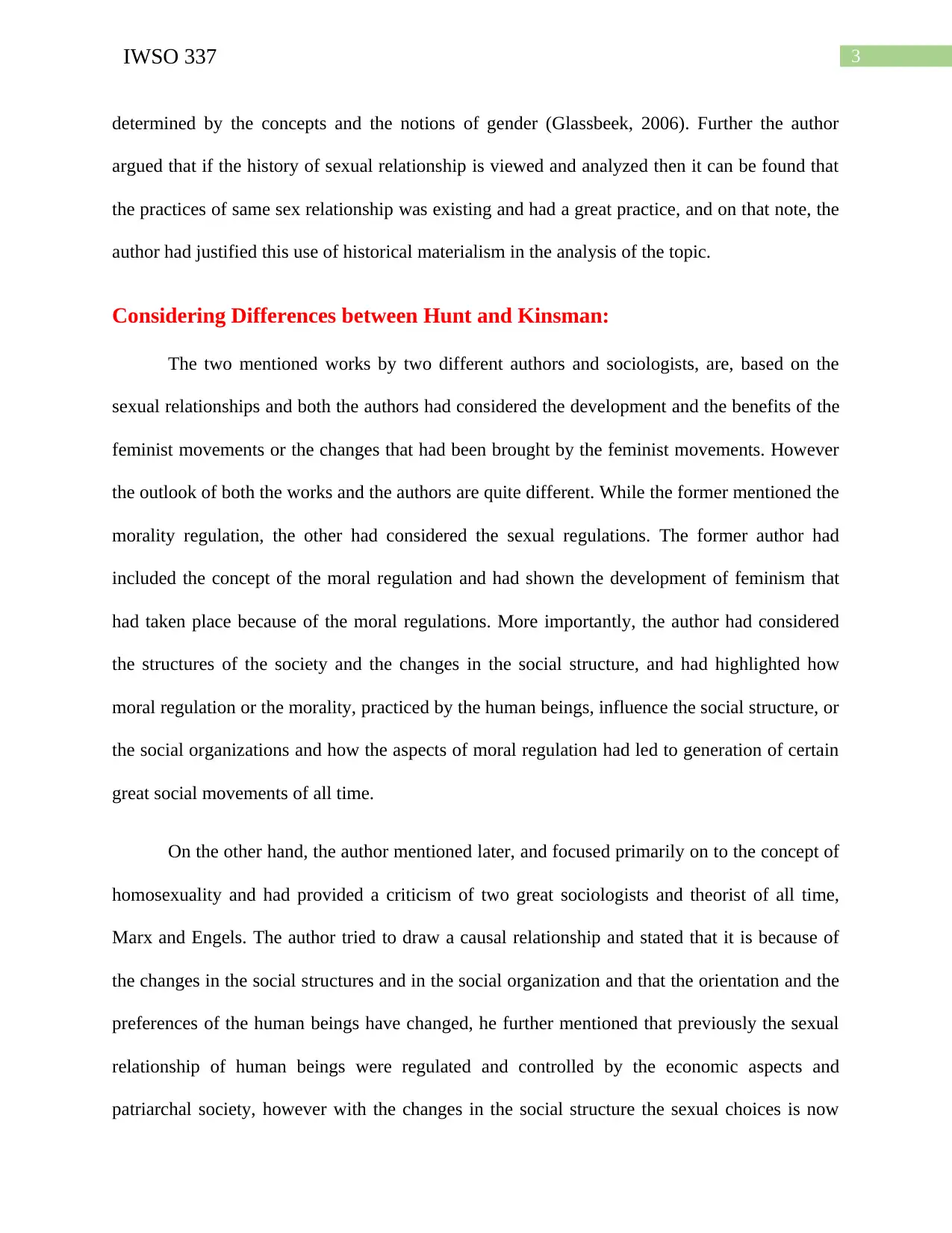
3IWSO 337
determined by the concepts and the notions of gender (Glassbeek, 2006). Further the author
argued that if the history of sexual relationship is viewed and analyzed then it can be found that
the practices of same sex relationship was existing and had a great practice, and on that note, the
author had justified this use of historical materialism in the analysis of the topic.
Considering Differences between Hunt and Kinsman:
The two mentioned works by two different authors and sociologists, are, based on the
sexual relationships and both the authors had considered the development and the benefits of the
feminist movements or the changes that had been brought by the feminist movements. However
the outlook of both the works and the authors are quite different. While the former mentioned the
morality regulation, the other had considered the sexual regulations. The former author had
included the concept of the moral regulation and had shown the development of feminism that
had taken place because of the moral regulations. More importantly, the author had considered
the structures of the society and the changes in the social structure, and had highlighted how
moral regulation or the morality, practiced by the human beings, influence the social structure, or
the social organizations and how the aspects of moral regulation had led to generation of certain
great social movements of all time.
On the other hand, the author mentioned later, and focused primarily on to the concept of
homosexuality and had provided a criticism of two great sociologists and theorist of all time,
Marx and Engels. The author tried to draw a causal relationship and stated that it is because of
the changes in the social structures and in the social organization and that the orientation and the
preferences of the human beings have changed, he further mentioned that previously the sexual
relationship of human beings were regulated and controlled by the economic aspects and
patriarchal society, however with the changes in the social structure the sexual choices is now
determined by the concepts and the notions of gender (Glassbeek, 2006). Further the author
argued that if the history of sexual relationship is viewed and analyzed then it can be found that
the practices of same sex relationship was existing and had a great practice, and on that note, the
author had justified this use of historical materialism in the analysis of the topic.
Considering Differences between Hunt and Kinsman:
The two mentioned works by two different authors and sociologists, are, based on the
sexual relationships and both the authors had considered the development and the benefits of the
feminist movements or the changes that had been brought by the feminist movements. However
the outlook of both the works and the authors are quite different. While the former mentioned the
morality regulation, the other had considered the sexual regulations. The former author had
included the concept of the moral regulation and had shown the development of feminism that
had taken place because of the moral regulations. More importantly, the author had considered
the structures of the society and the changes in the social structure, and had highlighted how
moral regulation or the morality, practiced by the human beings, influence the social structure, or
the social organizations and how the aspects of moral regulation had led to generation of certain
great social movements of all time.
On the other hand, the author mentioned later, and focused primarily on to the concept of
homosexuality and had provided a criticism of two great sociologists and theorist of all time,
Marx and Engels. The author tried to draw a causal relationship and stated that it is because of
the changes in the social structures and in the social organization and that the orientation and the
preferences of the human beings have changed, he further mentioned that previously the sexual
relationship of human beings were regulated and controlled by the economic aspects and
patriarchal society, however with the changes in the social structure the sexual choices is now
Paraphrase This Document
Need a fresh take? Get an instant paraphrase of this document with our AI Paraphraser
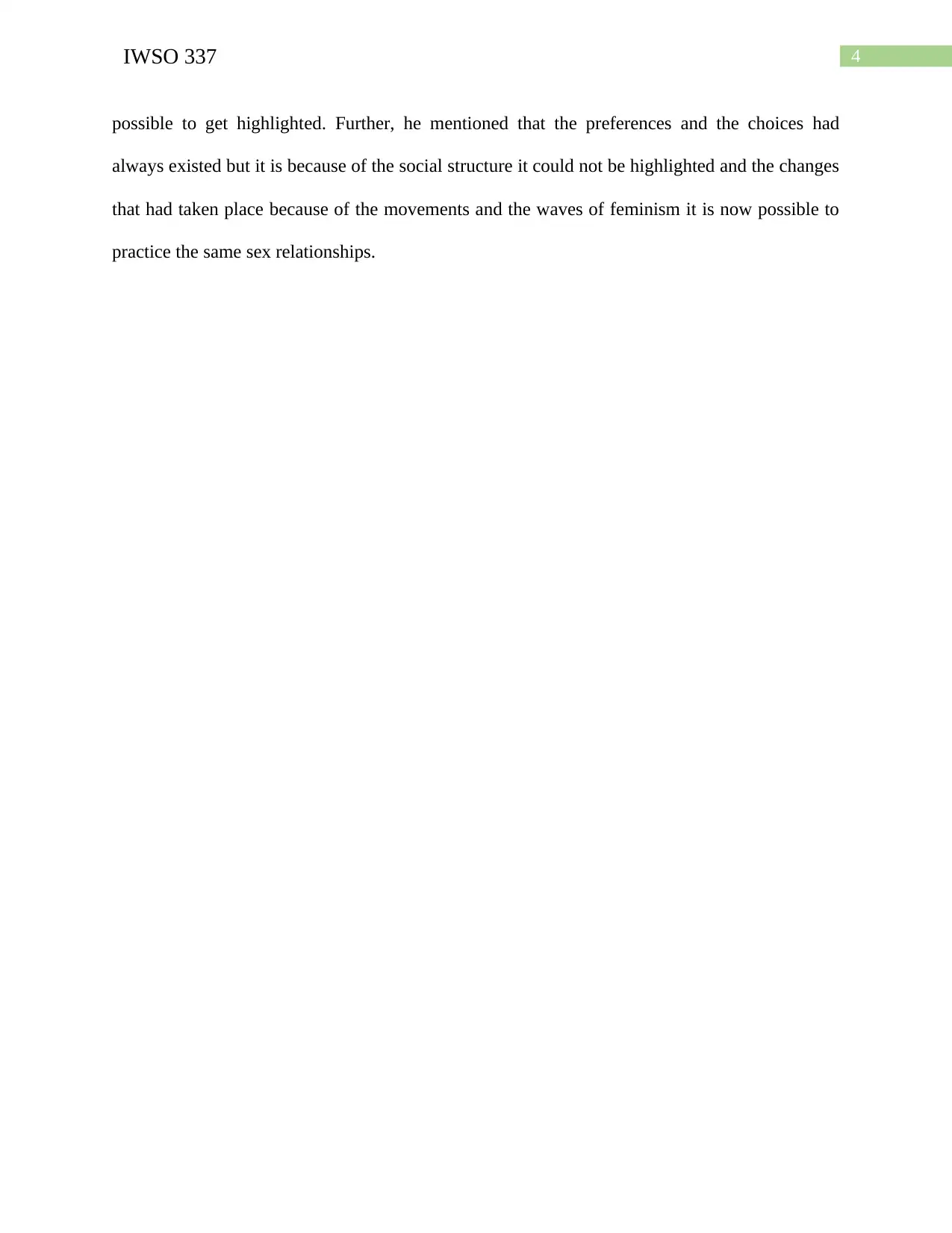
4IWSO 337
possible to get highlighted. Further, he mentioned that the preferences and the choices had
always existed but it is because of the social structure it could not be highlighted and the changes
that had taken place because of the movements and the waves of feminism it is now possible to
practice the same sex relationships.
possible to get highlighted. Further, he mentioned that the preferences and the choices had
always existed but it is because of the social structure it could not be highlighted and the changes
that had taken place because of the movements and the waves of feminism it is now possible to
practice the same sex relationships.
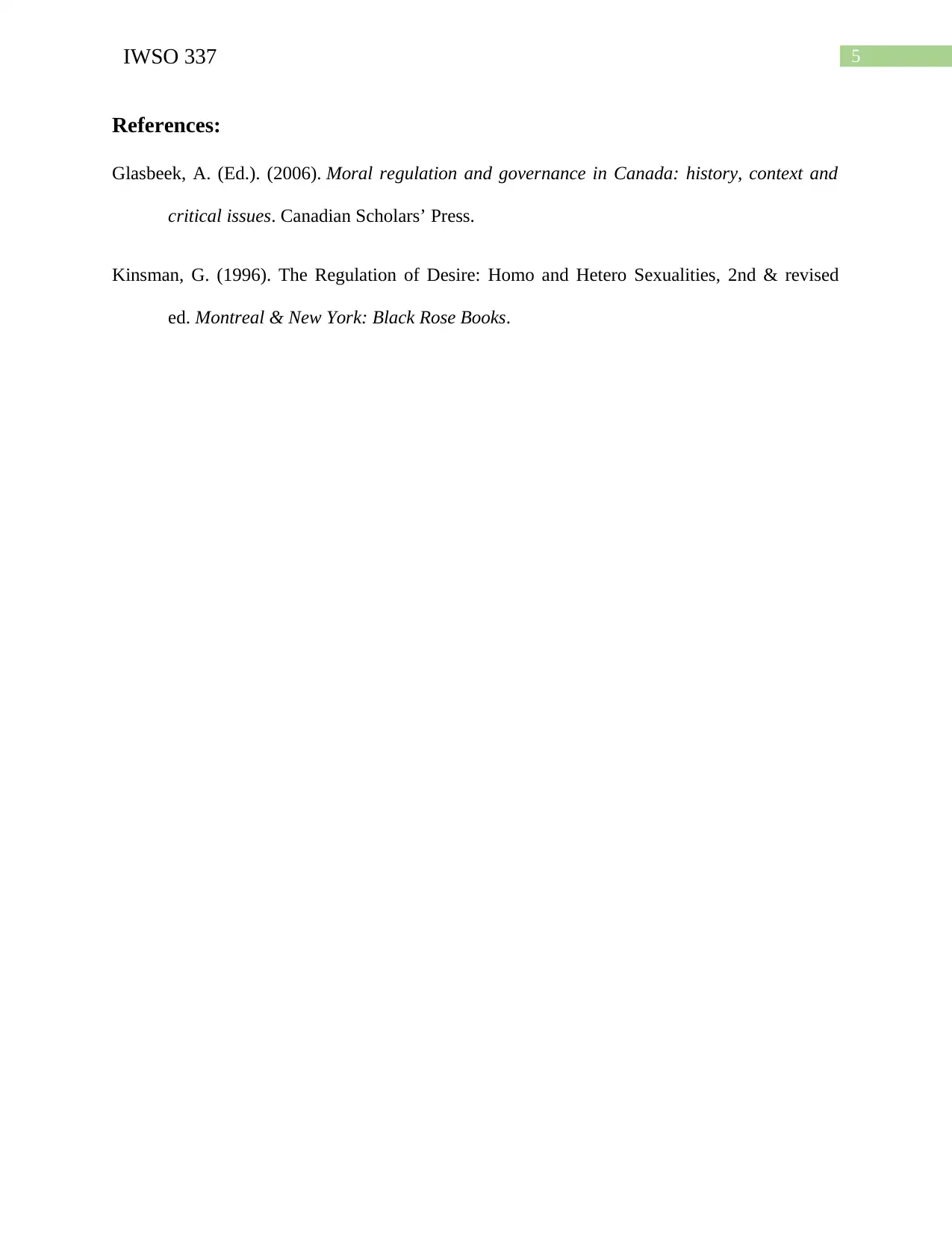
5IWSO 337
References:
Glasbeek, A. (Ed.). (2006). Moral regulation and governance in Canada: history, context and
critical issues. Canadian Scholars’ Press.
Kinsman, G. (1996). The Regulation of Desire: Homo and Hetero Sexualities, 2nd & revised
ed. Montreal & New York: Black Rose Books.
References:
Glasbeek, A. (Ed.). (2006). Moral regulation and governance in Canada: history, context and
critical issues. Canadian Scholars’ Press.
Kinsman, G. (1996). The Regulation of Desire: Homo and Hetero Sexualities, 2nd & revised
ed. Montreal & New York: Black Rose Books.
⊘ This is a preview!⊘
Do you want full access?
Subscribe today to unlock all pages.

Trusted by 1+ million students worldwide
1 out of 6
Related Documents
Your All-in-One AI-Powered Toolkit for Academic Success.
+13062052269
info@desklib.com
Available 24*7 on WhatsApp / Email
![[object Object]](/_next/static/media/star-bottom.7253800d.svg)
Unlock your academic potential
Copyright © 2020–2026 A2Z Services. All Rights Reserved. Developed and managed by ZUCOL.




